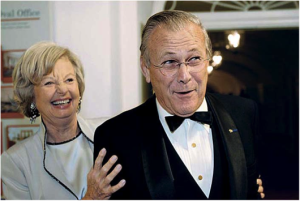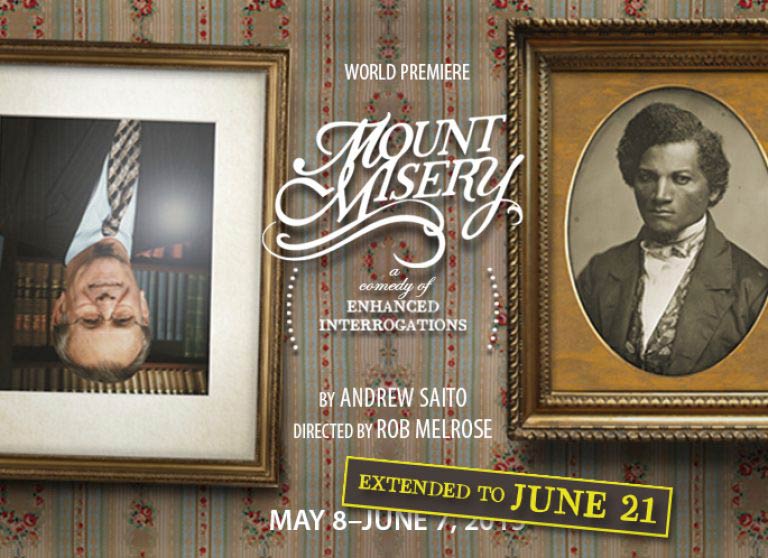
MOUNT MISERY
by resident playwright Andrew Saito
directed by Rob Melrose
Two prominent American figures. One parcel of land. All share a history that reaches across time from the genesis of the Civil War to the aftermath of the War on Terror.
About the Play
On a plantation called “Mount Misery” in a small Maryland town, a teenage Frederick Douglass once fought his overseer and triumphed. This moment would permanently alter the course of Douglass’ life, freeing him from fear and building a new sense of agency.Over 150 years later, former U.S. Secretary of Defense Donald Rumsfeld bought the mansion and property to use as a vacation home. Andrew Saito’s new play, Mount Misery, juxtaposes Douglass and Rumsfeld’s life works and philosophies. This satire examines the United States’ inconsistent progress on issues of human rights and race by imagining the two men interacting across time. Mount Misery was commissioned by Cutting Ball and developed as part of the 2014 edition of RISK IS THIS… The Cutting Ball New Experimental Plays Festival. The world premiere production runs concurrently with the 2015 RISK IS THIS Festival in celebration of Cutting Ball’s new play development program from commissions to full productions!
Reviews
"Snark would be easy, as would playing to our comfortable notions of right and wrong. Saito’s play, commissioned by and developed with Cutting Ball Artistic Director Rob Melrose...seldom takes an easy way out" - Robert Hurwitt, San Francisco Chronicle
"[Playwright Andrew] Saito is too imaginative to settle for a simple parody...in Saito’s probing vision, every character has multiple personality layers, carefully developed by the actors and director Rob Melrose." - Jean Schiffman, SF Examiner
"Far from the usual glancing fictional encounter in which two historical figures compare notes and then go about their separate business, 'Mount Misery' embeds Douglass and Rumsfeld deep in each other’s lives with tragicomic consequences, and history may never be the same again." - Sam Hurwitt, Marin Independent Journal
"[Mount Misery is] an unwieldy but ultimately humane examination of the failings that make cruelty and violence so much a part of American history, and a timely question about what's to be done about things still too terrible to forgive." - Adam Brinklow, Edge SF
"Andrew Saito's intriguing historical drama Mount Misery...smoothly blends the plot between two centuries...Director Melrose balances the overlying actions and time period effortlessly." - Richard Connema, Talkin' Broadway
" ...funny, shocking, thought provoking, brilliant, entertaining, and altogether marvelous." - Charles Kruger, TheatreStorm
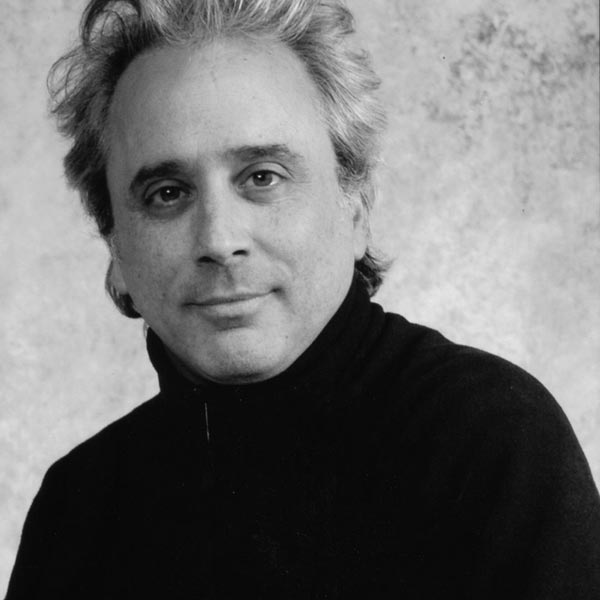
David Sinaiko (Donald Rumsfeld) is a Cutting Ball Associate Artist, appearing in many of their productions since 2001, including: Ubu Roi; Krispy Kritters in the Scarlett Night; The Chairs; Strindberg Cycle; Tenderloin; Lady Grey and Other Plays; The Tempest; …and Jesus Moonwalks the Mississippi; The Bald Soprano; Victims of Duty; Endgame; Taming of the Shrew; Macbeth; and Woyzeck. He’s a founding member of Chicago’s acclaimed New Crime Productions where credits include Heart of a Dog; The Balcony; Fear & Loathing in Las Vegas; Accidental Death of an Anarchist; Methusalem; and Alagazam! Other credits include: Shotgun Players (recently completed role: Chorus in Antigonick), Just Theater, The Goodman Theatre, The Actor’s Gang, Golden Thread, Crowded Fire, and SF Playhouse, and 10 seasons performing David Sedaris’ The Santaland Diaries. Film and television credits include The Grifters, Bob Roberts, Carnosaur and The Untouchables. David co-directs the theater program at Marin Academy.
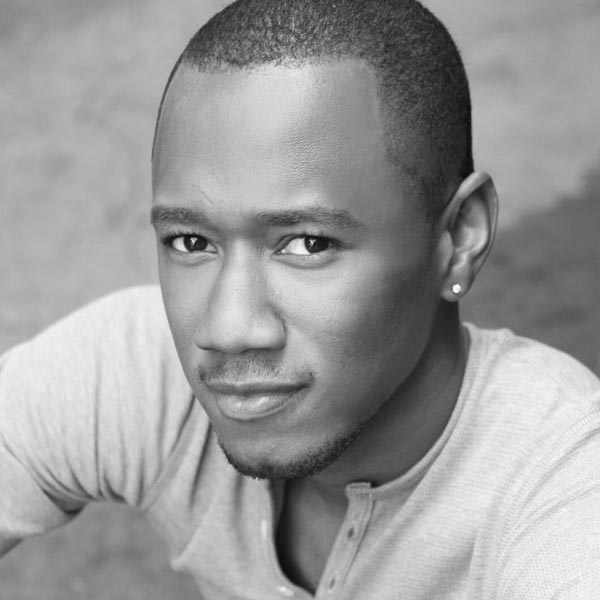
Giovanni Adams (Frederick Douglass) is a member of Rogue Machine Theatre Company. He recently appeared in Amerkya (Work in Progress) with Critical Mass Performance Group and The Recommendation at IAMA Theatre Company. He was cast in two world premieres, Sunny Afternoonat Gangbusters Theatre Company and the LA Drama Critics Circle award winning and Ovation nominated One Night in Miami at Rogue Machine. Stage credits: Bela Lugosi’s Dead (IAMA), Miss Julie and King Lear (Yale Repertory Theatre). Film/TV credits: Fatal Instinct, Nina, Criminal Minds, Zach Stone is Gonna Be Famous, Grey’s Anatomy, Gary UnMarried and the leading role of Hustle in Hustle vs. Heartache. Giovanni was born in Jackson, MS and received his BA from Yale University.
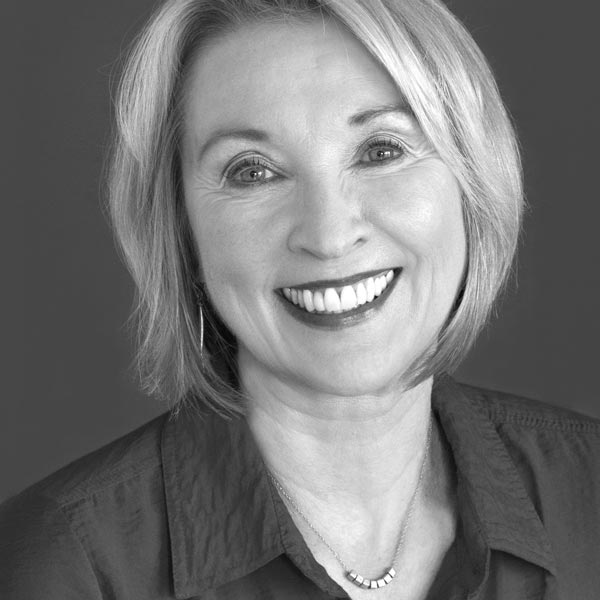
Lorri Holt (Joyce Rumsfeld) has been a leading actress in the SF Bay Area for 3+ decades and is making her Cutting Ball debut. Most recently she played Masha in the critically-acclaimed Vanya & Sonia & Masha & Spike at Berkeley Rep. For ten years she was a leading actress with San Francisco’s acclaimed Eureka Theatre, where she originated the role of Harper Pitt in Tony Kushner’s Angels in America. Other regional & international credits include work at Birmingham Rep in England, The Barbican in London, La Jolla Playhouse, California Shakespeare Theater, The Magic, Marin Theater Company, Actors Theatre of Louisville, SF Playhouse, and the Wilma Theatre. She holds a BA in Drama from UC Berkeley and an MFA in Writing & Literature from Bennington College. TV & movie credits include: Bee Season, Patch Adams, Eye on the Sparrow, Back to the Streets of San Francisco, and the upcoming Love & Taxes.
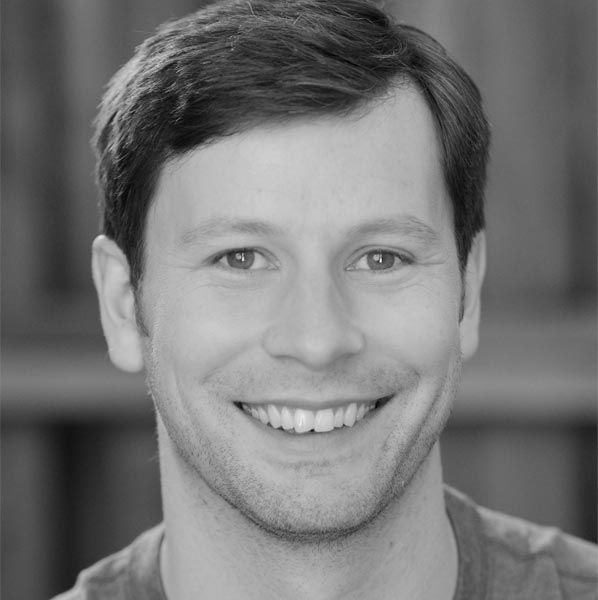
Geoffrey Nolan (Edward Covey) has worked with California Shakespeare Theater, Berkeley Repertory Theatre, Boxcar Theatre, Crowded Fire, Town Hall, We Players, and Douglas Morrisson Theatre, among others. He was nominated for Best Supporting Actor by the Bay Area Theatre Critics Circle for his work in Sam Shepard’s Fool for Love (Boxcar). Other memorable roles include Mohammed in the world premiere of Terroristka (Threshold), Jack in Hermes, God of Fraud (No Nude Men), and Cassidy in In Bed (Bay One Acts Festival). In the film Milk, he portrayed the longtime friend of Harvey Milk, Bill Kraus. Mr. Nolan is also Co-Producer and Operations Director of the immensely popular immersive theatre production, The Speakeasy, which will re-open at its new home in North Beach in early 2016. He holds a BA in English from Tufts University.

Rob Melrose (Director)is the Artistic Director and co-founder of the Cutting Ball Theater and works nationally as a freelance director. He has directed at The Public Theater (Pericles, Prince of Tyre), The Guthrie Theater (Happy Days, Freud’s Last Session, Pen, Julius Caesar - with the Acting Company); The Oregon Shakespeare Festival (Troilus and Cressida – in association with the Public Theater), Magic Theatre (An Accident, World Premiere); PlayMakers Rep (Happy Days); Black Box Theatre (The Creature, World Premiere, BATCC Award for direction), as well as Actors’ Collective; The Gamm Theatre; Cal Shakes; and Crowded Fire, among others. His directing credits at Cutting Ball include Communiqué no 10, Strindberg Cycle: The Chamber Plays in Rep, Krispy Kritters in the Scarlett Night (World Premiere), Pelleas & Melisande, the Bay Area Premiere of Will Eno’s Lady Grey (in ever lower light), The Tempest, The Bald Soprano, Victims of Duty, Bone to Pick & Diadem (World Premiere), Endgame; Krapp’s Last Tape; The Taming of the Shrew; Macbeth; Hamletmachine, As You Like It, The Death of the Last Black Man in the Whole Entire World, Roberto Zucco, and My Head Was a Sledgehammer among others. He has taught at Stanford University, UC Berkeley, USF, the University of Rhode Island and Marin Academy. He has a B.A. in English and Theater from Princeton University and an M.F.A. in directing from the Yale School of Drama.
Andrew Saito (Resident Playwright) has created more than 15 plays over the past 11 years, ranging from the intimate one-act she & he, to his 13-actor MFA thesis play Landless, to the multi-disciplinary Nuestra Señora de las Enfermedades. Awarded an Iowa Arts Fellowship, Andrew has taught playwriting and poetry to immigrant and underserved youth in San Francisco with WritersCorps and Performing Arts Workshop, in rural Mayan villages in Guatemala, and at Kearney Street Workshop’s Intergenerational Writers Lab. Saito’s work has been developed by the Bay Area Playwrights Festival, the Asian American Theatre Company, and Mixed Phoenix Theatre in New York, and presented at Intersection for the Arts, the Magic Theatre, Montalvo Arts Center, and other venues. Saito was a Resident Playwright at the Playwrights Foundation, and a Core Apprentice at the Playwrights Center of Minneapolis. He has been a finalist for New Dramatists’ Princess Grace Playwriting Award and a Jerome Fellowship, and in 2012 was awarded Fulbright Fellowship. Cutting Ball produced the World Premiere of his play Krispy Kritters in the Scarlett Night in 2013.

Rem Myers (Dramaturg)is in his third season at Cutting Ball and is the company’s associate producer and literary manager. You can see him in the Cutting Ball Theater as he (currently) produces the RISK IS THIS New Experimental Plays Festival, in which he is also directing a workshop of Chris Chen’s Caught. He has previously dramaturged for Cutting Ball’s Communiqué no? 10, Ubu Roi, and Sidewinders and has directed several Cutting Ball staged readings including Hamletmachine, A Murder of Crows, and The Oresteia. When he is not directing, producing, or dramaturging, he teaches at the Urban School of San Francisco.
Production Team
Tazwell Caputo Stage Manager
Michael Locher Set Designer
Heidi Leigh Hanson Costume Designer
Heather Basarab Lighting Designer
Cliff Caruthers Sound Designer
Brittany White Props Master
Dave Maier Fight Director
Rashad Pridgen Choreographer
Historical Background
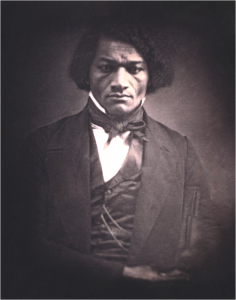 Frederick Douglass (1817-1895) was an abolitionist, orator, writer, and statesman. He began his life as a slave in Maryland (as Frederick Bailey) and at the age of 12, his master’s wife would teach him the alphabet (which was illegal) until his master discovered this and forbade it. Understanding that “Knowledge is the pathway from slavery to freedom,” Douglass continued to learn how to read and write in secret, and learned about the anti-slavery movement by reading a pamphlet on the subject by John Quincy Adams.
Frederick Douglass (1817-1895) was an abolitionist, orator, writer, and statesman. He began his life as a slave in Maryland (as Frederick Bailey) and at the age of 12, his master’s wife would teach him the alphabet (which was illegal) until his master discovered this and forbade it. Understanding that “Knowledge is the pathway from slavery to freedom,” Douglass continued to learn how to read and write in secret, and learned about the anti-slavery movement by reading a pamphlet on the subject by John Quincy Adams.
At the age of 16, Douglass was rented out to Edward Covey (who was 28) by his master for one year at the Mount Misery plantation. During this time, Covey beat Douglass constantly until one day Douglass fought back. The two men (plus Covey’s cousin) fought for almost two hours until Douglas emerged victorious. After the event, Covey did not touch Douglass again and Douglass escaped shortly after to the North, where he would adopt the surname Douglass, to avoid detection.
Frederick Douglass settled in Massachusetts and worked as a laborer, but soon became a leading figure in the Massachusetts antislavery movement. In 1845, he published his first autobiography “The Narrative of the Life of Frederick Douglass: an American Slave,” which became instantly popular. Now that the public knew he was an escaped slave, he left the country for Ireland and Great Britain for two years, where he gave lectures. He encountered far less racism in these countries but decided to return to America to help the abolitionist cause. Douglass raised enough money to buy his freedom, and returned to America in 1847 in Rochester, New York. For the rest of his life, he worked as an orator, writer, and abolitionist while continuing to travel and lecture.
“If there is no struggle, there is no progress. Those who profess to favor freedom, and yet depreciate agitation, are men who want crops without plowing up the ground. They want rain without thunder and lightning. They want the ocean without the awful roar of its many waters. This struggle may be a moral one; or it may be a physical one; or it may be both moral and physical; but it must be a struggle.”
-Frederick Douglass
Edward Covey (1805-1875) was a poor farm renter in Talbot County, Maryland, notorious for his occupation of breaking the spirit of unruly slaves. He was unusually fit for his job: he was cruel, hypocritically religious, unyielding, and hyper-vigilant. “He had the faculty of making us feel that he was always present,” wrote Frederick Douglass.
Almost all we know about Covey comes from Frederick Douglass’ autobiographies.
“He [Mr. Auld, Frederick Douglass’ master] resolved to put me out, as he said, to be broken; and, for this purpose, he let me for one year to a man named Edward Covey. Mr. Covey was a poor man, a farm-renter. He rented the place upon which he lived, as also the hands with which he tilled it. Mr. Covey had acquired a very high reputation for breaking young slaves, and this reputation was of immense value to him. It enabled him to get his farm tilled with much less expense to himself than he could have had it done without such a reputation. Some slaveholders thought it not much loss to allow Mr. Covey to have their slaves one year, for the sake of the training to which they were subjected, without any other compensation.”
Narrative of the Life of Frederick Douglass. Frederick Douglass, 1845
“I shall never be able to narrate the mental experience through which it was my lot to pass during my stay at Covey's. I was completely wrecked, changed and bewildered; goaded almost to madness at one time, and at another reconciling myself to my wretched condition.”
My Bondage and My Freedom. Frederick Douglass, 1855
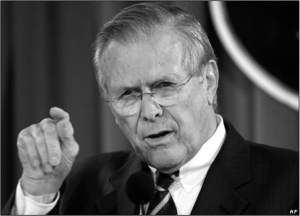 Donald Rumsfeld was the youngest and the oldest United Stated Secretary of Defense and during his second tenure, under Bush, he played a key role in the American Invasion of Afghanistan in 2001 and the military’s program of torture and detention.
Donald Rumsfeld was the youngest and the oldest United Stated Secretary of Defense and during his second tenure, under Bush, he played a key role in the American Invasion of Afghanistan in 2001 and the military’s program of torture and detention.
He has been described as tough, pragmatic, confident, but above all, ambitious. People have called him an “aggressive promoter of particular ambition,” and a “bureaucratic black belt.”
Rumsfeld was born in 1932, grew up in the Chicago suburb of Winnetka, and attended Princeton University. After graduation, he joined the navy as a pilot and later became the director of the Office of Economic Opportunity under Nixon. During the Watergate Scandal, he was the US ambassador to NATO (and was out of the country at the time) and when he returned he was appointed White House Chief of Staff by Ford and soon after became Ford’s Secretary of Defense. After his short stint as Secretary of Defense, he joined the private sector as the CEO of a fortune 500 company and campaigned a brief (but failed) run for the presidency in 1988.
Rumsfeld is close friends with Dick Cheney (Cheney called Rumsfeld the model for his life) and it was Cheney himself who suggested to George W. Bush to bring on Rumsfeld as Secretary of Defense.
In 2006, Rumsfeld retired due to loss of popularity and controversy surrounded the Wars in Iraq and Afghanistan, notably due to the torture practices revolving around Abu Ghraib and Guantanamo Bay.
He has been described as being able to exude charm and arrogance at the same time. Richard Nixon once called him “a ruthless little bastard” and his political adversary, Henry Kissinger called him “a special Washington phenomenon: the skilled full-time politician-bureaucrat in whom ambition, ability, and substance fuse seamlessly.”
Joyce Pierson (born in Billings, Montana) attended New Trier High School in Winnetka, Illionis where she was described as petite, blonde, and popular. There, she met Donald Rumsfeld and the two began dating during their senior year. While Joyce attended University of Colorado and Donald attended Princeton, they continued correspondence and he would send her various newspaper clippings he believed she would find interesting (this practice still continues today). They married in 1954, shortly after their respective graduations.
Joyce never wanted any political position of her own, unlike her husband, though she did travel to Afghanistan for a conference on women’s issues and has served on a number of educational foundations. In 1984, she established the Chicago Foundation for Education, a non-profit aimed at giving public elementary school teachers grants and training to teach values and ethics.
Joyce has also been described as “the velvet glove for Don. He’s a little hard-edged; she’s got a great touch with people. “ (Ned Jannotta).
Mount Misery
Long after the Douglass/Covey confrontation, Mount Misery eventually became a bed and breakfast, and is currently a home for the Rumsfelds. As journalist Amy Goodman writes “It is ironic that this notorious plantation run by a practiced torturer would now be owned by Rumsfeld, himself accused as the man principally responsible for the U.S. military's program of torture and detention.”
The town of St. Michaels, Maryland, where the plantation is located, has certainly undergone a transformation since Douglass’ time. Then, he describes few comfortable dwellings and a population with a drinking habit. Now it is a resort town for several Washington elite, including Rumseld and also Dick Cheney.
“What the current state of Mount Misery (and its previous incarnation as a B-and-B) represents is an attitude toward history in which the meanings of past events, people, and places do not deserve our preservation, respect, or full understanding. It represents, in particular, an attitude toward American history in which legal property rights take precedence over the uncodified right of the people to their shared cultural past. “
-Ian Frederick Finseth
In Their Own Words - Dramaturgy by Rem Myers
From "The Torture Memos"
Seeing Ourselves in Mount Misery - director's note by Rob Melrose
Playwright's Notes by Andrew Saito
We are grateful to our Kickstarter backers for believing in this project:
Aaron Eaton, BootStrap Theater Foundation, Cade Peterson, Carina Salazar, Carol Gamble, Caroline Tsen, Carolyn Ingram, Catherine Porter, Chas Belov, Cherrie Moraga, Chia Hamilton, Clara Long, David Phillips, Elizabeth Spreen, Fabian Skibinski, François Luong, Gail Finney, Georgia Ann Hughes, Ian E. Stockdale, James Helman, Jason Wong, Jennifer Schwartz, Jessica Price, Jessica Spurling, Jody, Jon Chintanaroad, Joseph Schnaudt, Joyce Dattner, Julie Montanari, Katherine Thomas, Ken Yee, Kim Bender, Mary Anne Cook, Mary Foose, Mary Hardy, Michael Heller, Michelle Carter, Natalie Grand, Pamela Thornton, Patricia Frank, Peter Illes, Peter Nachtrieb, Randall Heath, Rebecca Martinez, Robert Messick, Samantha Behr, Shawn Aebi, Stacey Chess, Susan Tieh, Sylvia Richmond & Fei Tsen
And to our Gala Opening Night Sponsor for providing delicious food:
FarmerBrown Soul Food

